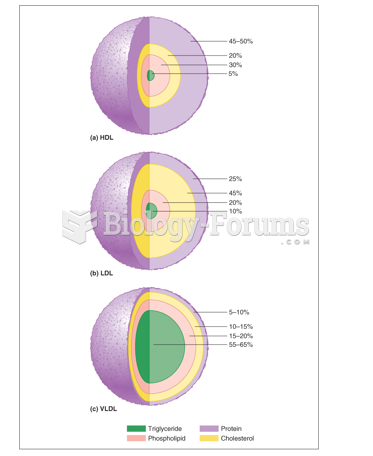Answer to Question 1
Correct Answer: 1
Rationale 1: Clients with diabetes mellitus require more aggressive therapy to reduce the risk of atherosclerosis.
Rationale 2: Cholesterol is excreted from the liver through the biliary tract, so diminished renal function has no effect on lipid levels and atherosclerosis risk.
Rationale 3: There is no association between iron-deficiency anemia and elevated LDL levels, but LDL levels might be decreased if the iron deficiency is severe.
Rationale 4: Hyperthyroidism increases the rate of lipoprotein metabolism, which would lead to a decrease in LDL levels.
Global Rationale: Clients with diabetes mellitus require more aggressive therapy to reduce the risk of atherosclerosis. Cholesterol is excreted from the liver through the biliary tract, so diminished renal function has no effect on lipid levels and atherosclerosis risk. There is no association between iron-deficiency anemia and elevated LDL levels, but LDL levels might be decreased if the iron deficiency is severe. Hyperthyroidism increases the rate of lipoprotein metabolism, which would lead to a decrease in LDL levels.
Answer to Question 2
Correct Answer: 2,3,4
Rationale 1: Pressure in the large vessels is detected by baroreceptors not chemoreceptors in the regulation of blood pressure.
Rationale 2: Oxygen in the large vessels is detected by chemoreceptors in the regulation of blood pressure.
Rationale 3: Carbon dioxide in the large vessels is detected by chemoreceptors in the regulation of blood pressure.
Rationale 4: pH in the large vessels is detected by chemoreceptors in the regulation of blood pressure.
Rationale 5: Water is not detected by chemoreceptors in the large vessels in the regulation of blood pressure.
Global Rationale: Oxygen, carbon dioxide, and pH in the large vessels are all detected by chemoreceptors in the regulation of blood pressure. Pressure in the large vessels is detected by baroreceptors not chemoreceptors in the regulation of blood pressure. Water is not detected by chemoreceptors in the large vessels in the regulation of blood pressure.







